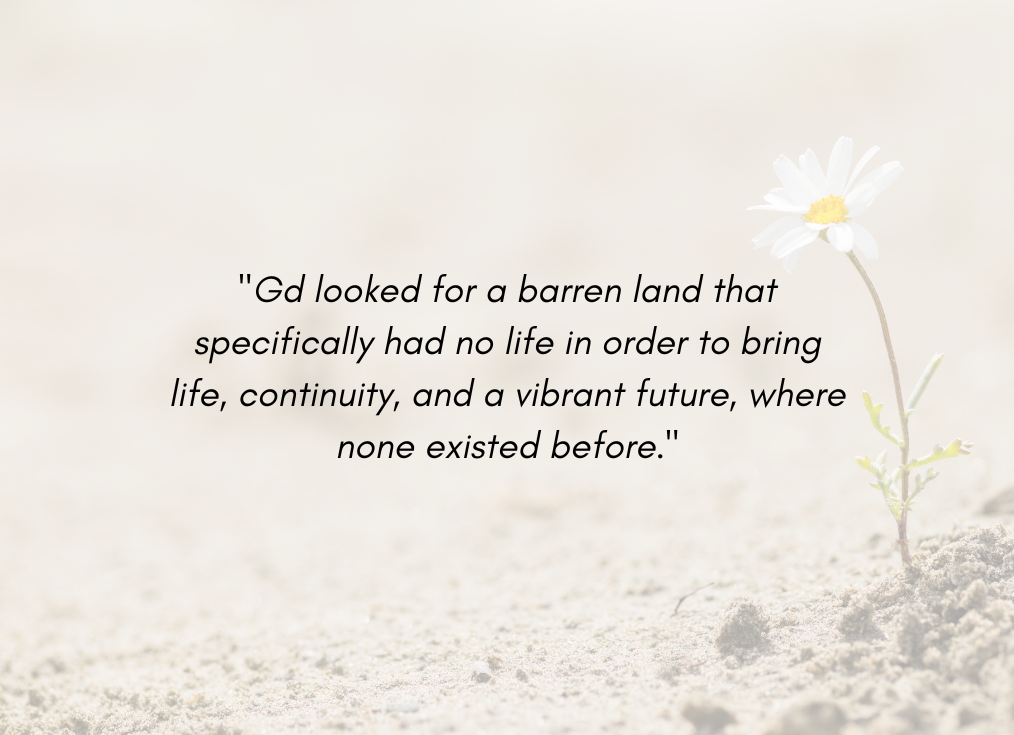Nurturing Growth: Fire, Water, and Land

May 19, 2023
There is a Midrash (rabbinic interpretation) that associates three earthly elements to the opening verse of this week’s Torah portion, Bamidbar. We read in this first verse in the fourth Book of the Torah, the Book of Numbers, that while Gd was speaking to Moses “Bamidbar Sinai” (“in the Sinai Desert” Numbers 1:1), that the elements of fire, water, and land were all present.
Midrash Bamidbar Rabbah 1:7 explains that:
- Fire is attributed to the verse, “Mount Sinai was smoking in its entirety because Gd descended upon it in fire” (Exodus 19:18).
- Water is attributed to the verse, “Even the heavens trickled; even the clouds dripped water” (Judges 5:4).
- Land is attributed to the introductory verse of this week’s parshah, “Gd spoke to Moshe in the wilderness of Sinai” (Numbers 1:1).”
There is a second rabbinic tradition that the reason Gd gave the Israelites the Torah in the desert was to demonstrate that life could flourish wherever the people took the wisdom of the Torah to heart. Where the people genuinely embraced the Torah’s values, ethics, and morals. Gd looked for a barren land that specifically had no life in order to bring life, continuity, and a vibrant future, where none existed before.
I am not a natural gardener, but I have always admired those who are able to innately grow flowers, plants, and wildlife. Their ability to nurture seedlings through germination, into maturity, and ultimately bring about a plant’s full beauty and vigor. And although this was not my gift from Gd, this week’s Torah portion still speaks to me, nonetheless.
You see, although every seedling needs its sun, water, and soil in which to grow, so too does the Torah need us to embrace its warmth, to consume its sustenance, and to root ourselves in its foundation. The great Chinese philosopher Lao Tzu once wrote, “To see things in the seed, that is genius.” To visualize the potential beauty, influence, and reward of the seed in its maturity, while it remains unseen in its seedling status; that is the great challenge of life.
We are tasked with the purpose of embracing the lessons of the Torah, of how we are to live our lives in relation to one another. To help us bring about the best in each other and to affect real and positive change in the world, especially when a relationship may be dormant or seemingly without life; that is our greatest challenge.
Last night the Jewish Federation brought together twenty current and retired healthcare service professionals. There were doctors and nurses, practicing clinicians and academics, all of whom had a different and yet common lens into being a Jewish medical practitioner. The gathering was the first of our local Maimonides Society since the outbreak of the pandemic over three years ago. The group discussed ways to revive this dormant society. They spoke of providing energy and passion for bringing this affinity group together (the “fire”). They shared ideas for vibrant content and meaningful subject matter (the “water”). And they consistently, even if unknowingly at times, circled back to Maimonides’ principle of looking at the world through a Jewish lens (the “land”).
For over 3300 years, our tradition has taught us that what we do is more important than what we say, think, or feel. What will each of us do this weekend that will revive that broken relationship, nurture that neglected bond, or nourish the connection that we want to continue growing?
The great Sufi mystic and poet, Rumi, once wrote, “Every leaf that grows will tell you: what you sow will bear fruit, so if you have any sense, my friend, don’t plant anything but Love.” May we all only plant the seeds of what we want to grow around us. Because the world is better when we are…
STRONGER TOGETHER.
Shabbat Shalom,

